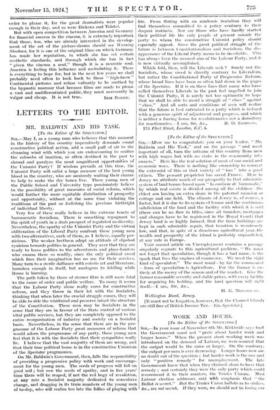LETTERS TO THE EDITOR.
■ -•-■1101■-•■•■•■•
MR. BALDWIN AND HIS TASK.
[To the Editor of the SPECTATOR.] Sia,—May I, as a young man who believes that this moment in the history of the country imperatively demands sound constructive political action, add a small puff of air to the cleansing wind with which you are endeavouring to scatter the cobwebs of inaction, so often. destined in the past to shroud and paralyze the most magnificent opportunities of the Unionist Party? If wisdom prevails at this time, the Unionist Party will enlist a large measure of the best young blood in the country, who are anxiously waiting their chance to help to make the dry bones live. These young men of the Public School and University type passionately believe in. the possibility of great measures of social reform, which 'would further the more equitable distribution of prosperity and opportunity, without at the same time violating the traditions of the past or forfeiting the precious birthright of individual liberty. .
"Very few of these really believe in the extreme tenets of 'bureaucratic Socialism. There is something repugnant to the spirit of youth in a drab prospect of regulated mediocrity. Nevertheless, the apathy of the Unionist Party and the virtual obliteration of the Liberal Party confront these young men with two alternatives, each of them, as I believe, equally per- nicious. The weaker brethren adopt an attitude of slipshod cynicism towards politics in general. They aver that they are ready to leave politics to the adventurers and place-hunters who swarm there so readily, since the only political creed which fires their imagination has no use for their services. Many turn to a sterile dalliance with coterie art and literature, harmless enough in itself, but analogous to fiddling while Rome is burning. • The path taken by those of sterner fibre is still more fatal
to the cause of order and public welfare. To many it seems that the Labour Party alone really cares for constructive 'reform, and they throw in their lot with the Socialists, thinking that when later the crucial struggle comes, they will be able to ride the whirlwind and preserve intact the structure of the Constitution.. These men may be Socialists in the sense that they are in favour of the State control of various vital public services, but they are completely opposed to the entire reorganization of industry and society on a Socialist basis. Nevertheless, in the sense that there are in the pro- gramme of the Labour Party great measures of reform that would adorn the programme of any party, these young men feel that it is with the Socialists that their sympathies really 'lie. I believe that the vast majority of them arc wrong, and 'that their true political home is in the constructive Unionism of the Spectator programmes.
On Mr. Baldwin's Government, then, falls the responsibility of providing a progressive policy with work and encourage- ment for the young men. The seeds of progress will fall on good soil ; .but sow the seeds of apathy, and in five years' time there will be reaped, if not the red bogy of revolution, at any rate a Socialist majority dedicated to convulsive change, and dragging in its train numbers of the young men of to-day,. who will realize too late the follies of playing with
fire. From flirting with an academic Socialism they will find themselves committed to a policy contrary to their deepest instincts. Nor are those who have hardly started their political life the only people at present. outside the party to whom. the constructive Unionist policy should especially appeal. Since the great political struggle, of- the future is between Constitutionalism and Socialism, the dis- appearance of the Liberal Party seems. to be inevitable. This has always been the avowed aim of the Labour Party, anil it is now virtually accomplished.
Which fold, then, will the Liberals seek ? Surely not the Socialists,. whose creed is directly contrary to Liberalism, but rather the Constitutional Party of Progressive Reform, whose broad lines have been so often laid down in the pages of the Spectator. If it is on these lines that many who have called themselves Liberals in the past feel impelled to join the Unionist Party, it is surely not too optimistic to hope that we shall be able to avoid a struggle of " class " against " class." And all sorts and conditions of men will realize that the future is best entrusted to a party which is imbued with a generous spirit of adjustment and progress, and which is neither a forcing house for revolutionaries nor a dormitory for reactionaries.—I am, Sir, &c., It. 0. SAMPSON. 173 Fleet Street, LOndbn, E.C. 4.










































 Previous page
Previous page